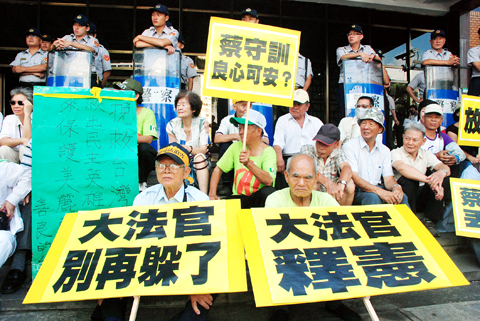Former president Chen Shui-bian (陳水扁) yesterday again refused to answer questions at his trial at Taipei District Court.
Presiding Judge Tsai Shou-hsun (蔡守訓) scheduled yesterday’s session to have Chen examine case files. All of Tsai’s questions to the former president regarding whether he had any comments about the files went unanswered.
As usual, the former president kept silent and did not make any gestures to protest what he has called an unfair judicial system.

PHOTO: CNA
Chen has relinquished his right to call witnesses or speak in his defense, saying he did not need to do so because he was innocent.
Prosecutors and Chen’s court-appointed attorney, Tseng Te-rong (曾德榮), also said little yesterday, telling the court they would save their comments until a later date for closing arguments.
Tsai set Tuesday as the date for the closing arguments.
Outside the courthouse, more than 100 of the former president’s supporters from groups including the Southern Taiwan Society and the Northern Taiwan Society gathered to demonstrate against his continued detention.
Holding up signs that read “Unjust judiciary” and “Release A-bian now,” the protesters called on the Grand Council of Justices to declare the switching of judges in Chen’s case unconstitutional.
Huang Yung-tien (黃永田), who was among the hundreds of protestors who gathered on July 10 for a detention hearing, returned yesterday, protesting with his hands in handcuffs.
Several protesters shouted “Tsai Shou-hsun, go to hell” and “A-bian is innocent.”
In January, Chen’s office asked the council to rule on the legitimacy of his pre-trial detention and the switching of judges from Chou Chan-chun (周占春) to Tsai.
While Chou presided over Chen’s case, he twice ruled against detaining Chen. Tsai has repeatedly ruled to detain him.
In December last year, a panel of judges ordered that Chou be replaced by Tsai, who would preside over all of Chen’s cases, which would be merged.
The switch was controversial, with some claiming it was and politically motivated. Some legal experts said the decision to merge the trials had violated judicial procedures.

The manufacture of the remaining 28 M1A2T Abrams tanks Taiwan purchased from the US has recently been completed, and they are expected to be delivered within the next one to two months, a source said yesterday. The Ministry of National Defense is arranging cargo ships to transport the tanks to Taiwan as soon as possible, said the source, who is familiar with the matter. The estimated arrival time ranges from late this month to early next month, the source said. The 28 Abrams tanks make up the third and final batch of a total of 108 tanks, valued at about NT$40.5 billion

Travel agencies in Taiwan are working to secure alternative flights for travelers bound for New Zealand for the Lunar New Year holiday, as Air New Zealand workers are set to strike next week. The airline said that it has confirmed that the planned industrial action by its international wide-body cabin crew would go ahead on Thursday and Friday next week. While the Auckland-based carrier pledged to take reasonable measures to mitigate the impact of the workers’ strike, an Air New Zealand flight arriving at Taipei from Auckland on Thursday and another flight departing from Taipei for Auckland on Saturday would have to

A group from the Taiwanese Designers in Australia association yesterday represented Taiwan at the Midsumma Pride March in Melbourne. The march, held in the St. Kilda suburb, is the city’s largest LGBTQIA+ parade and the flagship event of the annual Midsumma Festival. It attracted more than 45,000 spectators who supported the 400 groups and 10,000 marchers that participated this year, the association said. Taiwanese Designers said they organized a team to march for Taiwan this year, joining politicians, government agencies, professionals and community organizations in showing support for LGBTQIA+ people and diverse communities. As the first country in Asia to legalize same-sex

MOTIVES QUESTIONED The PLA considers Xi’s policies toward Taiwan to be driven by personal considerations rather than military assessment, the Epoch Times reports Chinese President Xi Jinping’s (習近平) latest purge of the Chinese People’s Liberation Army (PLA) leadership might have been prompted by the military’s opposition to plans of invading Taiwan, the Epoch Times said. The Chinese military opposes waging war against Taiwan by a large consensus, putting it at odds with Xi’s vision, the Falun Gong-affiliated daily said in a report on Thursday, citing anonymous sources with insight into the PLA’s inner workings. The opposition is not the opinion of a few generals, but a widely shared view among the PLA cadre, the Epoch Times cited them as saying. “Chinese forces know full well that